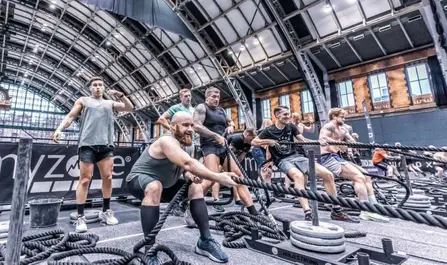Discover top fitness events to train for and achieve your goals while pushing your limits and embracing a healthier lifestyle.
How Setting a Fitness Goal Through an Event Keeps You Motivated
Setting a fitness goal through an event provides a unique and powerful way to stay motivated, track progress, and achieve physical milestones. The clear structure that events offer not only pushes individuals to train with intention but also instills a sense of urgency that can be crucial for success. It turns vague ambitions into tangible objectives, blending discipline with excitement. Here’s why training for a fitness event is a catalyst for sustained motivation.
A Clear and Definite Goal: The Power of Commitment

When you sign up for a fitness event, whether it’s a 5K, marathon, or an obstacle course race, the goal becomes clear and specific. Instead of an abstract “get fit” resolution, you now have a concrete target—a race day. This specificity provides a sense of direction, transforming training into a purposeful activity. You’re no longer wandering aimlessly in your fitness journey; every workout has a distinct purpose. This structured goal setting is a powerful motivator. It helps you focus and gives you a reason to push through the fatigue of training.
The Urgency Factor: Deadlines that Drive Action
A fitness event comes with a built-in deadline. Unlike an open-ended fitness goal, a race date is set in stone. This fixed timeline adds urgency to your efforts. Knowing that there is a specific day where you’ll be tested gives your workouts a sense of importance. The thought of facing the event without proper preparation is often enough to overcome procrastination. The pressure of the approaching date compels you to stay consistent with your training, ensuring that you don’t fall off track.
The Thrill of Competition: Pushing Your Limits
Competition, even in its most personal form, fuels motivation like nothing else. When you train for an event, you enter an environment that is, by nature, competitive. Whether you’re competing against others or simply striving to beat your personal best, the thrill of competition provides an internal drive to push past your limits. There is something incredibly empowering about knowing you are preparing to face an event where others will also be pushing their boundaries. This awareness can ignite a deep sense of determination to go beyond what you thought possible.
Structured Training: A Roadmap to Success

Training for a fitness event is not just about random gym sessions or occasional runs. It’s about adhering to a structured plan. Most fitness events come with recommended training schedules, providing a roadmap for how to progress. These plans take you step by step through different phases, allowing you to build strength, endurance, and skill at a sustainable pace. This structure eliminates the guesswork in your routine, leaving you with a clear path to follow. When you’re busy, having a training plan that tells you exactly what to do can be a tremendous source of motivation. It removes the stress of figuring out what to do each day.
Tracking Progress: Seeing Results is a Powerful Motivator
There’s something incredibly satisfying about seeing your improvements over time. Training for an event provides a quantifiable measure of progress. Whether it’s shaving time off your running pace, increasing the weight you can lift, or achieving more reps, the progress you make is tangible and visible. This creates a positive feedback loop: the more you improve, the more motivated you become to keep going. It’s not just about the finish line anymore; it’s about the incremental victories along the way. Tracking these accomplishments keeps you engaged, especially when progress starts to plateau. Small wins can reignite the spark that drives you.
Social Support: The Power of Community and Accountability
Training for a fitness event often involves a sense of community, whether it’s a group of friends, an online forum, or a local training club. Being part of a group with similar goals creates accountability. It also provides a social incentive—celebrating milestones together, sharing the challenges, and feeling supported by others. When you have people who are also working toward the same event, the motivation to stay consistent is amplified. You’re no longer alone on your journey; you’re part of a tribe with a shared purpose. This support system can make the hard days easier and the good days even more fulfilling.
Celebrating Milestones: Motivation Through Achievement
Fitness events provide natural milestones throughout the training process. From the first time you run a certain distance to completing a difficult workout, every achievement is a cause for celebration. These milestones mark significant progress and serve as a reminder of how far you’ve come. Celebrating these moments fuels your motivation to continue. It’s not just about the finish line; it’s about appreciating every small step along the way. This celebration of progress keeps you connected to the journey, ensuring that the path to your goal remains enjoyable and fulfilling.
Overcoming Obstacles: Building Resilience Along the Way
Training for a fitness event is rarely a smooth path. There will be obstacles—whether it’s bad weather, an injury, or simply a lack of motivation on certain days. However, the event provides a framework for overcoming these challenges. The thought of having to cancel or delay your participation because you haven’t been consistent can be a powerful motivator to push through difficult times. Every hurdle you overcome along the way strengthens your resilience. These moments of adversity become part of the narrative that leads to success. They teach you perseverance, and that, in itself, is a motivational tool that extends beyond the event itself.
The Final Push: The Reward of Achievement
As you approach the event day, your motivation reaches its peak. The combination of anticipation, physical preparation, and mental focus all align for the final push. The event provides the perfect reward for all your hard work—a day to test your progress, challenge yourself, and celebrate your accomplishment. Crossing the finish line or completing your challenge provides an indescribable sense of satisfaction. It validates the time, effort, and sacrifices made throughout your training. The event becomes a powerful culmination of everything you’ve worked toward, and it provides a sense of achievement that drives you to take on future challenges.
Long-Term Motivation: Keeping the Momentum Alive
Even after the event is over, the motivation gained from training for and completing a fitness event can propel you forward. The habit of setting and achieving goals becomes ingrained in your routine. The satisfaction of having completed the event creates a new standard for what you’re capable of. Many people find themselves signing up for new challenges soon after finishing their first, eager to maintain the momentum. The sense of accomplishment stays with you, continuing to inspire your future fitness endeavors.
Conclusion: The Power of Fitness Events in Keeping You Motivated
Setting a fitness goal through an event taps into numerous psychological and physical motivators—clear goals, deadlines, competition, progress tracking, community support, and resilience. These elements combine to create a powerful force that drives you to push harder, train smarter, and achieve your fitness ambitions. Fitness events serve as a reminder that goals are not only achievable but also rewarding, making them an essential tool for long-term motivation. Whether you’re aiming to complete your first 5K or pushing for a marathon, the structure and sense of purpose provided by these events will keep you on track toward success.
FAQ
What are the best fitness events to train for?
The best fitness events to train for depend on your fitness level and goals. Popular options include marathons, triathlons, obstacle courses like Spartan races, and cycling events.
How do I choose a fitness event that aligns with my goals?
Consider your fitness level, preferences, and the type of challenge you’re seeking. Choose an event that pushes you but is achievable within your training capacity.
How long should I train before a fitness event?
Generally, training for an event takes anywhere from 6 to 12 weeks, depending on the event’s complexity and your fitness level. It’s important to allow enough time for gradual improvement.
What are the benefits of training for a fitness event?
Training for a fitness event improves physical health, builds discipline, boosts mental toughness, and provides a structured goal to stay motivated and committed.
How do I stay motivated while training for a fitness event?
Set smaller milestones, track your progress, join training groups, and visualize the satisfaction of completing the event. Consistency and accountability help maintain motivation.
What type of fitness event should I train for as a beginner?
For beginners, starting with a 5k run, a fun run, or a short-distance cycling event can help build confidence and ease you into more challenging events as you gain experience.
How can I track my progress during training for an event?
Use fitness trackers, apps, or a journal to log your workouts, track distance, time, and improvements in strength or endurance, and monitor your health stats regularly.
How do I prepare mentally for a fitness event?
Visualization techniques, positive affirmations, and breaking the event down into manageable steps can help you stay mentally prepared. Focus on the journey, not just the outcome.
What are common mistakes to avoid when training for a fitness event?
Avoid overtraining, neglecting recovery, and underestimating nutrition. It’s important to listen to your body and gradually increase intensity without pushing too hard too soon.




